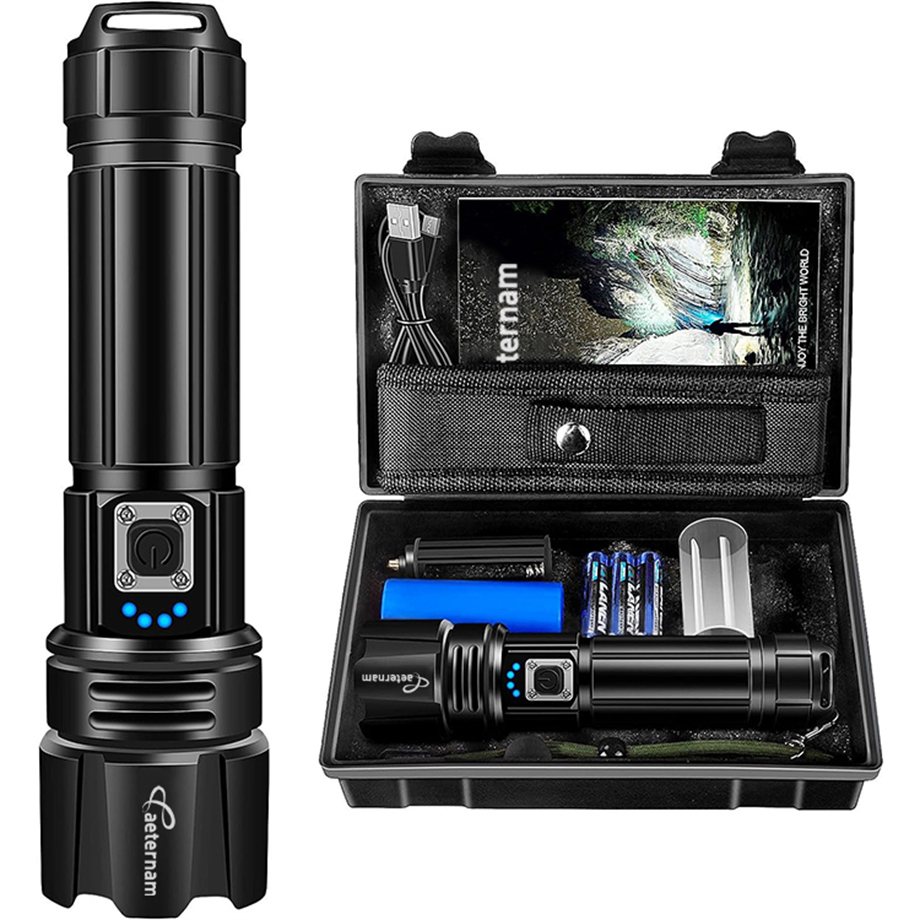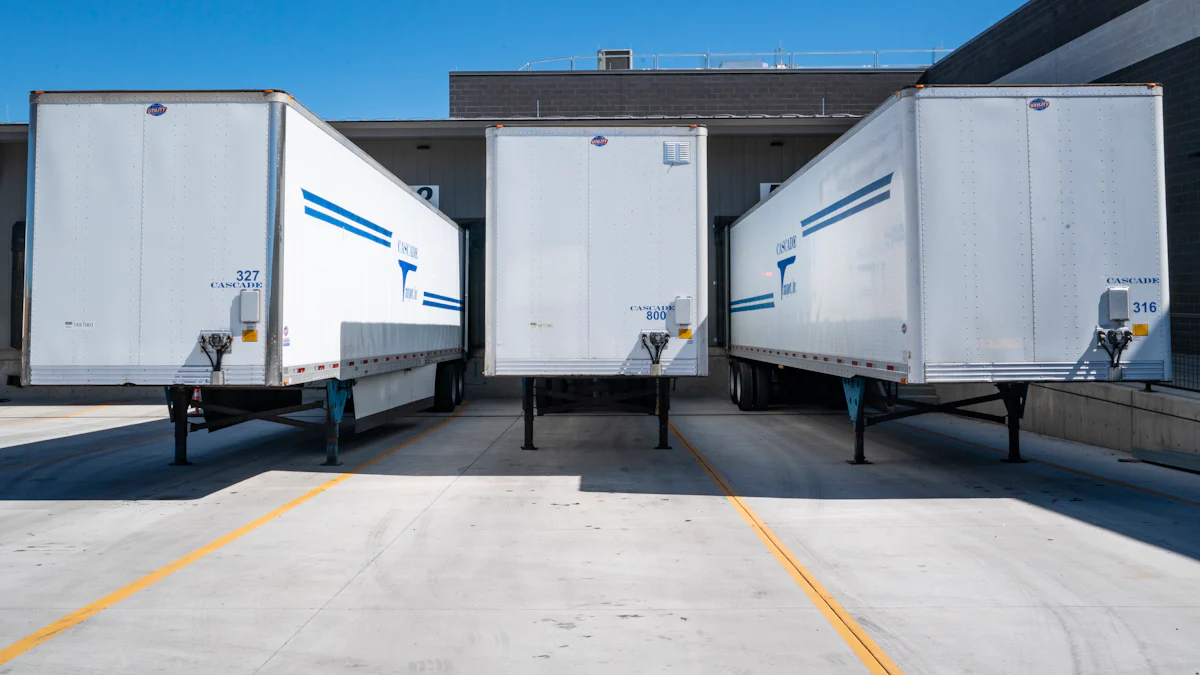How Supply Chain Disruptions Can Impact Your Bulk Flashlight Orders

Supply chain disruptions can significantly impact your bulk flashlight orders. These disruptions often result in delayed shipments, increased costs, and diminished availability. For instance, bulk buying usually reduces the need for frequent reorders and guarantees a steady stock, but disruptions can disrupt this process. Delivery times may extend, and stockouts can happen, affecting customer satisfaction. Maintaining a well-stocked inventory becomes more challenging, making it essential for you to comprehend how supply chain disruptions can impact your bulk flashlight orders. By tackling these challenges, you can protect your business from unforeseen setbacks.
Key Takeaways
Problems in the supply chain can slow deliveries and raise costs. They can also make products harder to get. Knowing these effects helps you plan and keep customers happy.
Using many suppliers lowers risks from problems in one area. This way, you can keep enough products during surprises.
Managing inventory well is very important. Buying in bulk and keeping the right amount of stock stops shortages and helps fill orders.
Using technology, like tracking tools and demand prediction, makes supply chains better. These tools help you check stock and guess future needs.
Having good relationships with suppliers builds trust and dependability. Regular orders and working together on plans improve service and solve problems.
Key Causes of Supply Chain Disruptions

Material Shortages
Material shortages create significant challenges in the supply chain. When raw materials or components become scarce, manufacturers struggle to meet production demands. For bulk flashlight orders, this can mean delays in assembly or incomplete shipments. Shortages often arise due to increased demand, natural disasters, or geopolitical tensions. You may notice that these supply chain issues lead to longer lead times and higher costs. Planning ahead and monitoring material availability can help you mitigate these risks.
Transportation Delays
Transportation delays are another common cause of supply chain bottlenecks. These delays disrupt delivery timelines, leading to stock shortages and slower order fulfillment. For example:
Delays in shipping can prevent you from maintaining a well-stocked inventory.
Bulk purchasing helps reduce the impact of delays by ensuring consistent stock availability.
A steady inventory improves your ability to fulfill orders quickly, enhancing customer satisfaction.
Factors like port congestion, weather conditions, and driver shortages often contribute to transportation challenges. By understanding these logistics hurdles, you can better prepare for potential disruptions.
Labor Shortages
Labor shortages significantly impact supply chain operations. A lack of workers in manufacturing, warehousing, or transportation can slow down production and delivery. For instance, fewer factory workers may result in reduced output, while a shortage of truck drivers can delay shipments. These supply chain issues often compound, creating bottlenecks that affect your bulk flashlight orders. Addressing labor shortages requires proactive measures, such as working with suppliers who prioritize workforce stability or investing in automation to reduce dependency on manual labor.
Global Events and Market Volatility
Global events and market volatility can disrupt your bulk flashlight orders in unexpected ways. Events like natural disasters, political instability, or economic downturns often ripple through the global supply chain. These disruptions can slow down production, delay shipments, or even halt operations entirely. For example, a hurricane in a manufacturing hub might damage factories or ports, causing delays in flashlight production and delivery.
Market volatility also plays a significant role. Fluctuating currency values, trade restrictions, or sudden changes in demand can increase costs and reduce availability. You might notice that raw material prices spike during economic uncertainty, which raises the overall cost of your bulk flashlight orders. Additionally, trade wars or tariffs can make importing components more expensive, further straining your budget.
The interconnected nature of the global supply chain means that even a small disruption in one region can have widespread effects. For instance, a labor strike at a major shipping port could delay shipments worldwide. You may find it challenging to predict these disruptions, but staying informed about global events can help you prepare.
To minimize the impact of global events and market volatility, consider diversifying your suppliers. Working with manufacturers in different regions reduces your reliance on a single source. Monitoring market trends and maintaining a buffer stock can also help you navigate these challenges. By taking proactive steps, you can protect your business from the unpredictable nature of the global supply chain.
How Supply Chain Disruptions Affect Bulk Flashlight Orders

Delayed Shipments
Shipping delays can create significant challenges for your bulk flashlight orders. These delays disrupt your ability to maintain a steady inventory, which can lead to stock shortages. Bulk purchasing typically helps you avoid frequent reorders and ensures your inventory remains stocked for longer periods. However, when shipments arrive late, this advantage diminishes.
Several factors contribute to delayed shipments, including transportation bottlenecks, port congestion, and adverse weather conditions. These disruptions slow down the delivery process, making it harder for you to fulfill customer orders on time. Consistent stock availability from bulk orders usually prevents disruptions in order fulfillment speed, but delays can undermine this reliability. Diversifying your supplier base can help mitigate the risk of delays caused by localized events, ensuring smoother operations.
Increased Costs
Supply chain disruptions often lead to higher costs for your business. Rising shipping costs, increased fuel prices, and labor shortages all contribute to this issue. When transportation delays occur, you may need to pay premium rates for expedited shipping to meet customer demands. These additional expenses can strain your budget and reduce profit margins.
Material shortages also play a role in driving up costs. Limited availability of essential components increases production expenses, which manufacturers may pass on to you. This situation forces you to reevaluate your pricing strategies, potentially affecting your competitiveness in the market. Monitoring logistics trends and planning ahead can help you manage these rising costs effectively.
Reduced Availability
Reduced availability of materials and products can severely impact your ability to meet customer demand. When essential materials are scarce, production slows down, leading to fewer flashlights being manufactured. This situation creates a ripple effect, making it harder for you to maintain adequate stock levels.
Manpower shortages and rising transportation costs further complicate the issue. Customers may lose trust in your business if you fail to meet their expectations. Additionally, supply chain issues like these can force you to adjust pricing, which may affect customer loyalty. To address reduced availability, consider maintaining a buffer stock and working with multiple suppliers to ensure a steady supply of products.
Quality Control Issues
Supply chain disruptions can lead to quality control issues in your bulk flashlight orders. When manufacturers face challenges like material shortages or labor constraints, they may rush production to meet deadlines. This haste often results in defective products or inconsistent quality. You might receive flashlights with faulty components, such as dim LEDs or weak battery compartments, which can harm your business reputation.
Transportation delays also contribute to quality problems. Prolonged shipping times expose products to environmental factors like humidity or extreme temperatures. These conditions can damage sensitive components, reducing the lifespan of your flashlights. For instance, batteries may corrode, or plastic casings may warp during transit. You need to inspect shipments thoroughly upon arrival to identify any defects caused by these supply chain issues.
Global events and market volatility further complicate quality control. Manufacturers may switch to alternative materials or suppliers to cope with disruptions. These substitutions often lack the same standards as the original components. You might notice variations in product performance or durability, which can frustrate your customers. Maintaining consistent quality becomes challenging when suppliers prioritize speed over precision.
To address these issues, establish clear quality standards with your suppliers. Request detailed specifications and quality assurance reports for every shipment. Partnering with reliable manufacturers who value quality over quantity can reduce the risk of receiving subpar products. Regular communication with your suppliers ensures they understand your expectations. By taking these steps, you can minimize the impact of quality control issues on your bulk flashlight orders.
Solutions to Overcome Supply Chain Challenges
Diversify Suppliers
Relying on a single supplier increases your vulnerability to supply chain issues. Diversifying your supplier base reduces risks associated with localized disruptions. For example, if one supplier faces production bottlenecks, another can step in to maintain your inventory flow. This strategy ensures consistent stock availability, even during global events or market volatility.
Working with suppliers from different regions also helps you navigate challenges like transportation delays or material shortages. By spreading your sourcing network, you minimize the impact of regional disruptions. Building strong relationships with multiple suppliers enhances reliability and ensures smoother operations.
Improve Inventory Management
Effective inventory management is crucial for overcoming supply chain challenges. Bulk purchasing ensures consistent stock availability, preventing stockouts during peak demand periods. Maintaining optimal stock levels reduces lead times and enhances order accuracy, allowing you to meet customer needs promptly.
To improve inventory management, consider these best practices:
Bulk buying reduces costs and maintains stock levels to meet customer demands.
Improved supplier coordination enhances planning and delivery schedules.
Maintaining optimal stock levels prevents overstocking and stockouts.
Strengthened supplier relationships through consistent orders lead to better service and reliability.
A McKinsey survey revealed that 70% of chief procurement officers believe improving demand transparency with suppliers is essential for navigating market challenges. Strengthening supplier coordination helps you plan better and avoid disruptions.
Leverage Technology
Technology plays a vital role in modern supply chain management. Tools like inventory tracking software and predictive analytics help you monitor stock levels and forecast demand accurately. These tools reduce the risk of overstocking or running out of inventory.
Automation streamlines logistics processes, improving efficiency and reducing delays. For instance, automated systems can track shipments in real time, alerting you to potential bottlenecks. Investing in technology enhances your ability to adapt to supply chain issues and maintain smooth operations.
Build Strong Supplier Relationships
Building strong supplier relationships is essential for ensuring a resilient and efficient supply chain. These partnerships help you anticipate risks, respond quickly to disruptions, and maintain a steady flow of bulk flashlight orders. A collaborative relationship with your suppliers fosters trust and reliability, which are critical during challenging times.
Here are some strategies to strengthen your supplier relationships:
Placing consistent bulk orders builds trust and enhances reliability. Suppliers value regular business, which can lead to better service.
Regular bulk buying elevates your status to a preferred customer. This often results in exclusive benefits, such as priority during high-demand periods.
Collaborating on forecasting and planning improves inventory management. This ensures that both you and your suppliers can meet demand efficiently.
Establishing long-term agreements creates stability. These agreements encourage suppliers to invest in the partnership’s success.
Simplifying logistics through bulk purchasing reduces errors and administrative tasks. This streamlines operations and strengthens the partnership.
Working with fewer suppliers allows for better communication. Stronger relationships with a smaller number of suppliers improve coordination and trust.
Strong supplier relationships also contribute to supply chain resilience. When you collaborate closely with suppliers, you can identify potential risks early and address them proactively. This approach enables quicker responses to disruptions, minimizing their impact on your business. For example, if a supplier faces a material shortage, a strong partnership allows you to work together to find alternative solutions.
These relationships also promote joint planning and innovation. By working together, you can adapt to challenges more effectively and maintain a stable supply chain. This collaboration ensures that your bulk flashlight orders remain consistent, even during periods of uncertainty. Investing in these partnerships strengthens your business and prepares you for future challenges.
The Importance of Proactive Planning for Supply Chain Resilience
Avoiding Last-Minute Challenges
Proactive planning helps you avoid last-minute challenges in the flashlight supply chain. By preparing in advance, you can reduce risks and maintain smooth operations. Several steps can help you stay ahead of potential supply chain issues:
Bulk buying ensures you have enough stock to meet customer demands during peak periods.
Supplier coordination improves delivery schedules and reduces lead times.
Inventory management balances stock levels, preventing overstocking or stockouts.
Streamlined procurement processes shorten procurement cycles and improve supplier relationships.
These strategies allow you to anticipate potential disruptions and respond effectively. For example, maintaining a buffer stock ensures you can fulfill orders even when delays occur. Strong supplier coordination also helps you plan for unexpected events, such as transportation delays or material shortages. By implementing these measures, you can minimize last-minute challenges and keep your supply chain running smoothly.
Strengthening Business Resilience
Strengthening your business resilience ensures long-term success in the flashlight supply chain. A resilient supply chain allows you to adapt quickly to disruptions and maintain consistent operations. This approach enhances efficiency, reduces costs, and improves service levels.
Resilience enables you to manage supply chain operations proactively. You can respond to disruptions effectively, minimizing costs related to procurement, production, and distribution. For example, diversifying your supplier network reduces reliance on a single source, making your supply chain more flexible. Smarter inventory management, such as shifting from "Just in Time" to "Just in Case," prepares you for unexpected events.
Digitizing processes also strengthens resilience. Real-time monitoring and AI solutions provide better insights, allowing you to make quick decisions. Centralizing data creates a single source of truth, improving accountability and problem-solving. Identifying vulnerabilities in your supply chain helps you address weaknesses before they become major issues.
By building resilience, you ensure your flashlight supply chain remains efficient and reliable. This approach not only saves costs but also enhances customer satisfaction through improved accessibility, availability, and on-time delivery.
Supply chain disruptions can create significant challenges for your bulk flashlight orders. Delayed shipments, increased costs, and reduced availability often disrupt your operations. However, proactive measures can help you overcome these obstacles. Strengthening supplier relationships, improving inventory management, and leveraging technology are effective strategies. By acting now, you can build a resilient supply chain that ensures consistent operations. Understanding how supply chain disruptions can impact your bulk flashlight orders allows you to prepare for uncertainties and maintain customer satisfaction.
FAQ
What are the most common causes of supply chain disruptions?
Material shortages, transportation delays, labor shortages, and global events often disrupt supply chains. These issues slow production, delay shipments, and increase costs. Monitoring these factors helps you anticipate potential challenges.
How can I reduce the impact of delayed shipments?
Diversify your suppliers and maintain a buffer stock. These strategies ensure you have backup options and enough inventory to meet demand during delays. Real-time tracking tools also help you monitor shipments.
Why is diversifying suppliers important?
Relying on one supplier increases your risk during disruptions. Diversifying suppliers ensures a steady flow of materials and products. This approach minimizes delays and keeps your operations running smoothly.
How does technology improve supply chain management?
Technology streamlines processes and provides real-time insights. Tools like inventory tracking software and predictive analytics help you forecast demand and avoid stockouts. Automation reduces errors and improves efficiency.
What steps can I take to strengthen supplier relationships?
Place consistent bulk orders and collaborate on planning. Building trust with suppliers ensures better service and reliability. Long-term agreements and regular communication also foster strong partnerships.
💡 Tip: Strong supplier relationships enhance resilience and help you navigate supply chain challenges effectively.
See Also
Top Suppliers for Bulk Flashlight Purchases You Need
Selecting Ideal LED Flashlights for Bulk Buying
Comprehensive Guide to Purchasing Flashlights in Bulk
